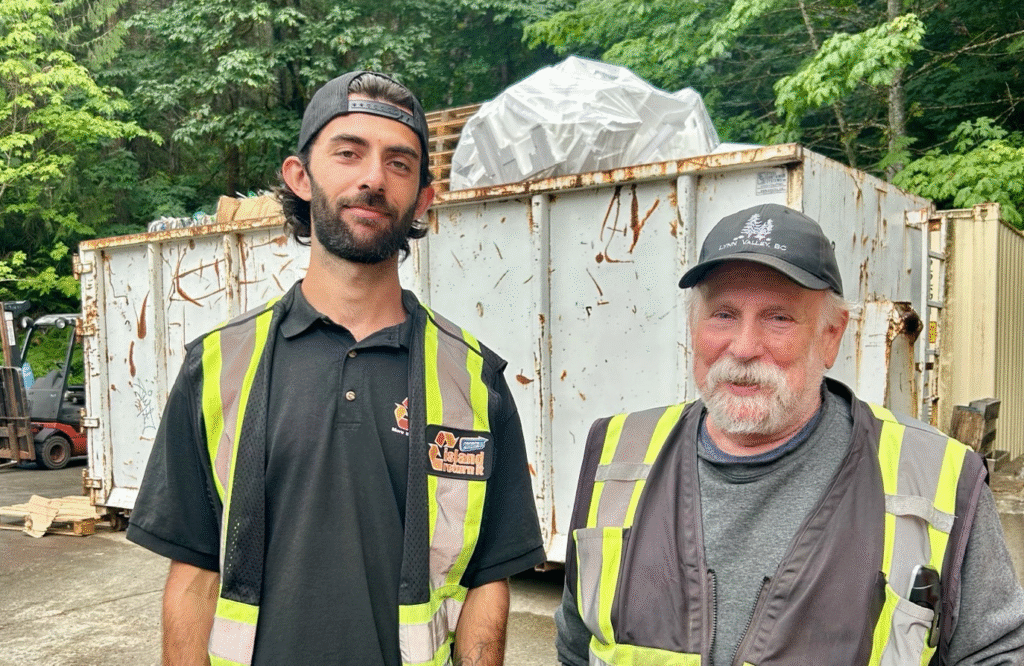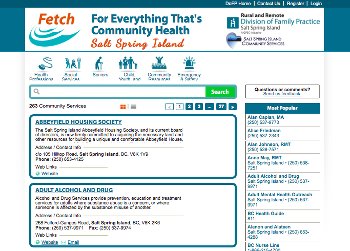
Kaleb Graham, Manager of Island Return It, and his grandfather Peter Grant, rounding 3 generations of a family connected to Recycling
Tucked into a forested corner of Salt Spring Island, the Recycling Depot, operated by Island Community Services (ICS), quietly powers regional environmental action—sorting, storing and shipping thousands of kilos of diverted waste each year. At its helm is Peter Grant, a calm, consistent force who has led the program for over 30 years, shaping it into one of the most comprehensive community recycling systems in the province.
But Salt Spring’s recycling roots run even deeper.
Local Startups to Provincial Systems
Salt Spring’s recycling journey began in the 1970s with SPEC (Society Promoting Ecological Conservation) members and community volunteers. One of the earliest drop-off sites was a roadside bin on Churchill Road—an old pig pen repurposed by Ray Hill. Volunteers collected waste and drove it to Victoria themselves. Operations grew organically over the years, from a shed at Mouat’s on the Ganges dock, to weekend runs in Vesuvius supported by the Ladies Auxiliary Fire Brigade. By 1980, nearly half the island participated—evidence of the community spirit that still defines Salt Spring’s approach.
In 1989, the curbside Blue Box program was launched in the Capital Regional District (CRD) and to offer equal access, ICS created a program that not only matched regional standards but often exceeded them, collecting additional materials where possible.
Peter Grant joined the team in 1992, stepping into a system already in motion thanks to the foundational work of Rick Laing. From 1989 onward, Laing had spearheaded the creation of the current depot site, securing tri-level government funding through the Environmental Partnerships Fund to build the infrastructure and purchase essential equipment. By the time Peter Grant arrived, the depot was already a well-oiled machine—although a very different one than what exists today. It accepted scrap metal and drywall, crushed glass onsite and marketed all materials independently. When Rick Laing left in 1993, Grant took over and gradually evolved the operation into a fully integrated, island-specific system that now bridges local initiative with provincial frameworks.
“Recycling here has always been about relationships,” Peter Grant says, “with haulers, regulators—and most of all, our community.”
Built on Relationships, Fueled by Collaboration
Each load of cardboard or stack of tetra packs reflects a complex web of partnerships—and Peter Grant knows how to navigate them.
The ICS Recycle Depot operates within BC’s Extended Producer Responsibility (EPR) framework, which holds manufacturers accountable for the full life cycle of their products. ICS works with multiple stewardship agencies, each with its own reporting, barcoding, and material handling standards. Peter’s role spans operations, logistics, and policy—ensuring compliance while making the system work for Salt Spring.
“We don’t make the rules,” he says with a wry smile, “but we do everything we can to make them work for this island.”
Thinking in Systems, Acting in Community
The CRD has long supported the Island Community Services recycling program, recognizing the island’s unique cost and logistics challenges. Unlike urban curbside systems, the ICS depot accepts a wide range of materials—from Styrofoam and soft plastics to paint, batteries, and fluorescent lights. Much of this is made possible through creative partnerships—like the long-standing relationship with the hauler MacNutts, who bring mulch and soil onto the island and backhaul sorted materials on their return.
“It’s serendipitous,” Peter says. “That kind of cooperation makes this all possible.”
People Power and Public Trust
Salt Spring’s recycling system was built on volunteer energy. In 1980, residents were asked to commit to just one or two shifts a year—a model that sparked broad engagement. Today at the ICS depot, Peter oversees a small, tight-knit team of employees, many of whom stay for years thanks to good working conditions, union benefits and shared purpose. Public interactions are overwhelmingly positive and BC’s EPR no-fee model ensures accessibility.
“We barcode and track every load,” Peter says. “Our plastics go to Merlin Plastics in New Westminster, where they’re turned into pellets and made into new products. This system works—and we help make sure it does.”
Looking Ahead
On any given day, Peter might be reviewing invoices, loading counted beverage containers or chatting with customers—often alongside his grandson, Kaleb Graham, who now manages the local Return-It Depot. For Peter, this work is part of a larger, generational story: one shaped by islanders who’ve always seen value in what others throw away.
“Great days are when I help someone, teach something, or just keep the system flowing,”says Grant. “This work matters—and it always has.”
This article is part of a series of program profiles in recognition of our 50th year of community service to Salt Spring and the Southern Gulf Islands.








